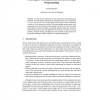Free Online Productivity Tools
i2Speak
i2Symbol
i2OCR
iTex2Img
iWeb2Print
iWeb2Shot
i2Type
iPdf2Split
iPdf2Merge
i2Bopomofo
i2Arabic
i2Style
i2Image
i2PDF
iLatex2Rtf
Sci2ools
103
click to vote
ICLP
2004
Springer
2004
Springer
Multi-agent Coordination as Distributed Logic Programming
A novel style of multi-agent system specification and deployment is described, in which familiar methods from computational logic are re-interpreted to a new context. One view of multi-agent system design is that coordination is achieved via an interaction model in which participating agents assume roles constrained by the social norms of their shared task; the state of the interaction reflecting the ways these constraints are mutually satisfied within some system for synchronisation that is open and distributed. We show how to harness a process calculus; constraint solving; unfolding and meta-variables for this purpose and discuss the advantages of these methods over traditional approaches.
Agents Assume Roles | Familiar Methods | ICLP 2004 | Multi-agent System Specification | Programming Languages |
Related Content
| Added | 01 Jul 2010 |
| Updated | 01 Jul 2010 |
| Type | Conference |
| Year | 2004 |
| Where | ICLP |
| Authors | David Robertson |
Comments (0)

